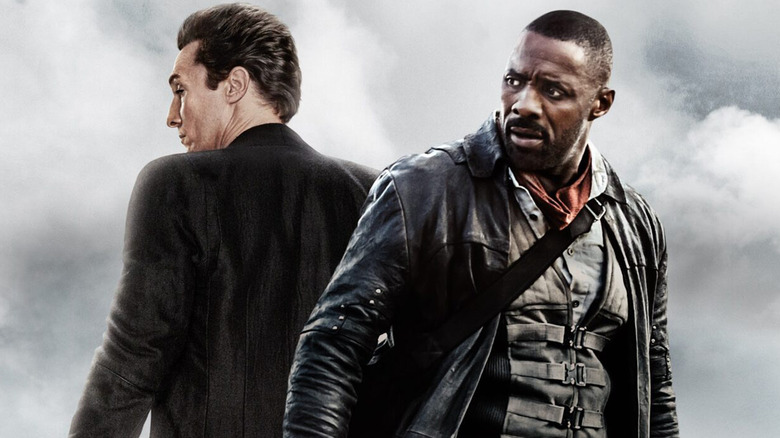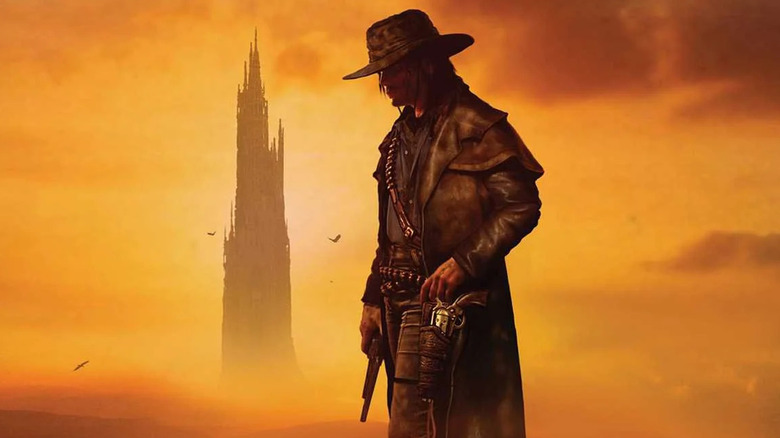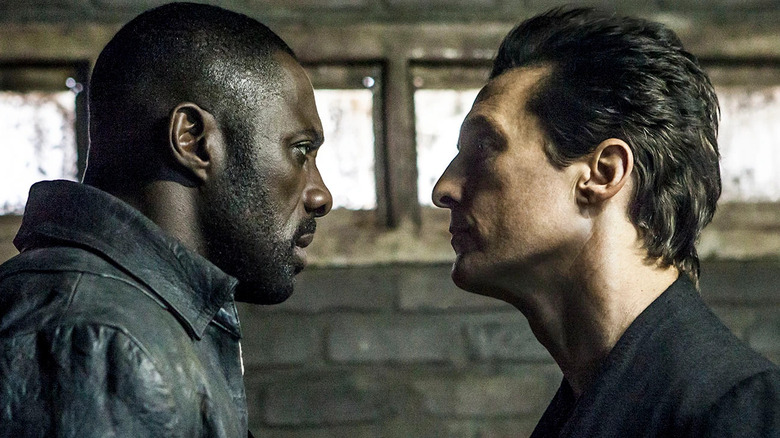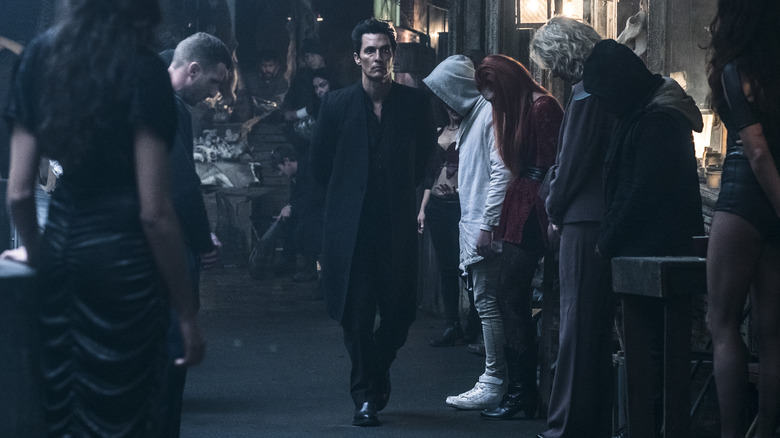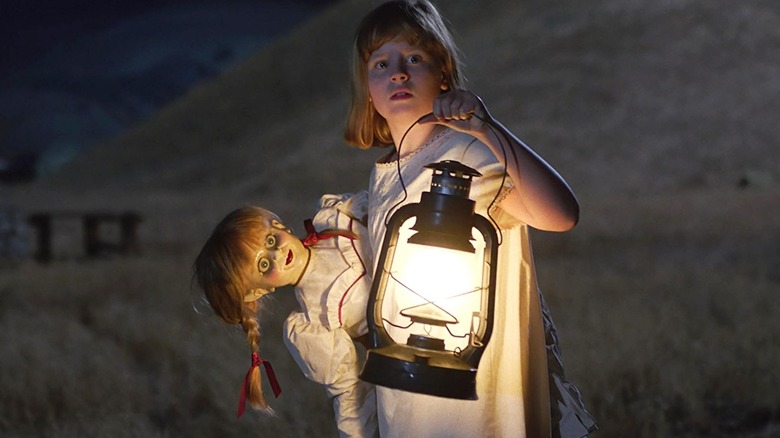Why 2017's The Dark Tower Movie Adaptation Bombed At The Box Office
There's good news for fans of author Stephen King, as a new adaptation of his book series "The Dark Tower" is on the way from "The Haunting of Hill House" creator Mike Flanagan and his producing partner, Trevor Macy. Though the story has frequently been described as "unfilmable," this will actually be the second adaptation in the space of a few years. Directed by Nikolaj Arcel, the 2017 "Dark Tower" movie had two strong leading men in Matthew McConaughey and Idris Elba, but was panned by critics and failed to break even at the box office.
That might sound like bad news for Flanagan and Macy's adaptation, but they're taking a different approach to the "unfilmable" story by developing it as a five-season television series, with the potential for two spin-off feature films if the TV show is successful. Flanagan already has a good track record with Stephen King adaptations, having previously directed "Gerald's Game" for Netflix and the "Shining" sequel "Doctor Sleep," and he calls "The Dark Tower" his "dream project." So why was the last attempt at bringing it to the screen such a nightmare?
With a $66 million budget, "The Dark Tower" grossed just $113 million. The math varies, but typically movies need to gross around 2 to 2.5 times their production budget before they break even, due to the costs of marketing and distribution, so "The Dark Tower" definitely ended its box office run in the red. But was it doomed from the start?
The long road to The Dark Tower
By the time "The Dark Tower" finally came to the big screen, it had already spent a decade in development hell. "Lost" co-creators J.J. Abrams and Damon Lindelof optioned the rights in 2006 for just $19. Prior to that, Stephen King explained, "I said no to everybody [...] because I didn't think much of the chances of it being a good movie." He even turned down an offer from Frank Darabont, who had a strong track record with other adaptations like "The Shawshank Redemption" and "The Green Mile."
As Abrams and Lindelof attempted to adapt "The Dark Tower" in between working on "Lost," they started to see why King had his doubts. The story needed major reworking to fit into the mold of the movie, but they were such huge fans that they couldn't bear to make those changes. In 2009, Lindelof told MTV, "My reverence for Stephen King is now getting in the way of what any good writer would do first when they're adapting a book, which is take creative license in changing stuff." Later that year, Abrams confirmed that they had no longer had any active plans to make the movie.
With the "Lost" duo out of the picture, Universal Pictures moved in next, planning a whole trilogy of "Dark Tower" movies with Ron Howard attached to direct, as well as a tie-in television series. King thought that the mix of movies and television might finally be the solution to adapting his magnum opus — and perhaps Mike Flanagan and Trevor Macy will still prove him right. But Universal quickly got cold feet; first the studio started reining in the budget for the project, and within less than a year it had been canceled altogether.
A tough sell
There's a reason there are so many successful movies based on Stephen King novels: horror is usually a reliable draw at the box office. But "The Dark Tower" isn't really a horror story; the books sit at the intersection of fantasy, sci-fi, and Western genres, all of which are a much tougher sell. Here's the official logline for the 2017 movie, which represents the marketing team's best efforts to pitch this immensely complicated tangle of lore to general audiences:
A boy haunted by visions of a dark tower from a parallel reality teams up with the tower's disillusioned guardian to stop an evil warlock known as the Man in Black who plans to use the boy to destroy the tower and open the gates of Hell.
As premises go, it's a lot more convoluted than a family going to stay in a haunted hotel, or a bullied teenager unleashing telekinetic powers. And that's just the tip of the iceberg; "The Dark Tower" encompasses the Stephen King multiverse, which means that the books also feature characters from other King novels, like Pennywise from "IT" and Father Callahan from "Salem's Lot." McConaughey's character, Randall Flagg, was also the main antagonist in "The Stand" and shows up in a few other books. And then, of course, there's Maturin, the giant cosmic turtle god who vomited our universe into existence.
The marketing
It's easy to blame the marketing when a movie fails to perform at the box office, but the trailer for "The Dark Tower" was actually pretty well-crafted, and probably saved the movie from cratering even harder than it did. There's some rudimentary exposition about Gunslingers and the Man in Black, but otherwise it downplays the fantasy elements and leans hard into the element of Idris Elba saying badass lines and firing guns in a cool way. It gives a lot of breathing room to the Gunslinger's famous "I do not aim with my hand; he who aims with his hand has forgotten the face of his father" mantra, which was its best shot at crossover appeal between fans of the books and general audiences (cool speeches and epic shootouts are a tried-and-true combo).
Meanwhile, the posters were heavily angled around the two leading men. Elba was best known for playing Stringer Bell in "The Wire" and Heimdall in the Marvel Cinematic Universe, giving him a blend of critically-acclaimed cool and mainstream appeal. Matthew McConaughey was still riding the high of his Oscar win for "Dallas Buyers Club," his brief but unforgettable role in "The Wolf of Wall Street," and the small-screen success of "True Detective." Between them, they carried a lot of clout into "The Dark Tower." But the age of the movie star is in decline, and very few actors can still draw crowds merely by having their name and face on a poster.
Slain by an evil doll
Both the story and the marketing for "The Dark Tower" made an effort to angle it as a mature new YA franchise — one of many would-be successors to "The Hunger Games." King pinpointed this toning down of the source material to fit a four-quadrant-friendly PG-13 rating as one of the two main reasons why the movie failed:
"The major challenge was to do a film based on a series of books that's really long, about 3,000 pages. The other part of it was the decision to do a PG-13 feature adaptation of books that are extremely violent and deal with violent behavior in a fairly graphic way. That was something that had to be overcome, although I've gotta say, I thought [screenwriter] Akiva Goldsman did a terrific job in taking a central part of the book and turning it into what I thought was a pretty good movie."
But "The Dark Tower" needed to be a lot better than "pretty good" to conquer the box office. The movie's release was preceded by a rash of bad reviews, and it received a middling B CinemaScore from audiences. The built-in audience was also limited; the "Dark Tower" books aren't among King's most popular works, and even die-hard fans have struggled to get through them.
The final nail in the coffin was, ironically, a horror movie. The week after "The Dark Tower" debuted, Warner Bros. released the "Conjuring" prequel spinoff "Annabelle: Creation." Most of the remaining horror fans who might have been tempted by a new Stephen King movie were stolen away by the evil doll, and "The Dark Tower" dropped to fourth place in its second weekend, and to ninth place in its third weekend. Meanwhile, "Annabelle: Creation" went on to gross over $300 million worldwide.
